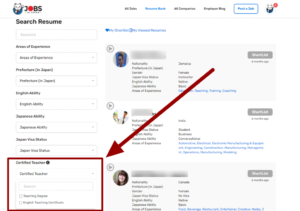02
Visit our interview guide page
We want to make sure you are ready and know what to expect. Review the interview questions and advice below.
03
Get ready for your interview.
Suit up! A video interview is an actual interview so look sharp. Relax and enjoy the interview.
See It In Action!
What is an On-Demand Video Interview?
This is not a video resume, but a video interview system where you take a number of set common interview questions via your computer or smartphone which are then attached to your resume and job applications. Basically this allows you to showcase your abilities and personality in a way that a resume or cover letter just can’t.
These kinds of interviews are used to accelerate the hiring process, remove barriers and hiring bias. As the process is standardized with every applicant getting the same questions and the same amount of time to answer each question, the hiring process is fairer than traditional live interviews.
If you are a Certified or Licensed Teacher and applying for jobs in education, you should select the Certified Teacher interview.
Our data shows that applications with videos attached get opened more often than those without a video. The video interview gives you an opportunity to show your professionalism, and allows you to introduce yourself as a person, and not merely a set of qualifications and experiences. Face time is especially important in Japan, and your video interview will put you directly in front of hiring managers without needing to:
- Figure out each other’s schedule or take a day off to interview for a new job
- Travel across town on packed trains to meet in-person
- Needlessly suffer through an interview where you both figure out five-minutes in that it’s not a good fit for either of you.
This is a time saver and a game changer for interviewing for jobs in Japan.
The video interview consists of a number of general interview questions that you might expect during a live interview, but you can record your answers on your own time. Even better than a live interview as you can retake the interview as many times as you like until you are satisfied.
The whole interview should take about 10 minutes, perhaps a bit longer if you take multiple attempts at each question or wish to really think about your response before answering.
The maximum response time to any question is only one minute long.
While some smartphones have cameras superior to many webcams, please be sure to use some kind of holder (kickstand, tripod or a stack of books) to keep your phone stable. Also be careful of the camera angle to have it level with your face or pointed slightly downward.
Please be sure to create an online resume and have your privacy settings for your online resume set to “viewable” allowing registered employers to view and contact you. While you can apply to jobs using your PDF or MS Word resume, you need an online interview to be a part of the resume bank which employers can search for potential employees.
Employers can search via key words or various other criteria such as location, language skills, visa status, etc.
If you have taken the video interview, employers will see a video player icon next to your resume listing as below.

Absolutely! If you receive an invitation from an employer to take an online interview and fail to do so, you are basically ignoring the hiring manager at the company you applied to, which will probably eliminate your chances of being considered for the position.
You can retake the interview as many times as you like until you are satisfied with the results. We want for you to look your best.
You are not going to be the perfect match or best candidate for all the jobs that you have applied to. With the JobsinJapan.com video First Round video interview, you are filtering out all the employers that are genuinely not a good fit for you.
This system is proven to get you a better job faster, and those that have taken the JobsinJapan.com First Round Video Interview have received more offers in less time.
It only takes a few minutes to increase your chances for a job and actually saves you time and effort. No need to schedule lots of similar interviews, this way it is one-and-done.
Employers sift through dozens of nearly-identical resumes every day. It can be very hard to make a decision on who to invite for an interview when you have limited time to do so. Finishing your First Round interview gives them more information that could result in you being put on the shortlist of people to hire, rather than the pile of resumes that didn’t make it past a first glance.
A video interview makes your profile more noticeable, interesting, and attractive to the people who will be hiring you. Employers in Japan place a large emphasis on cultural fit and they want to see if you understand the Japanese culture well enough to work in their company.
Employers can see which of their applicants have taken a video interview as well as invite any applicant to take one. This is your chance to show yourself off, so don’t pass it up just because people usually just send in a paper resume.
The image below shows what employers see, and it’s easy to notice which job seeker applicants have a video and which don’t. If you don’t have one, some employers will just go with people who already have theirs done.

Note: We use Speechace pronunciation and fluency evaluation technology to give this score. Native level speakers will have no problem achieving a high score. We share these results with employers as this not only helps employers who may not speak English well to assess hires, but also reduces discrimination based on nationality and name bias by giving an impartial speaking score to hiring managers.
A popular feature is our Certified Teacher Database which is the largest pool of pre-interviewed qualified teachers in Japan! Here employers the ability to proactively scout for qualified teachers. We have integrated the First Round Video Interviews into this section as well so employers can read your qualifications and see you.
If you have a teaching degree or some kind of teacher or TESOL certification, being part of this unique database of teachers WILL help you get a (better) teaching job!
Note: Certified / Licensed teachers will get a special set of teacher-specific questions to better highlight your skills.
How many times have you wasted your time on inconveniently scheduled interviews which both you and the employer knew right away were not a good match? At least this way you do it once and save both you and your potential employers time wasted in awkward interviews. Now you are in control of the hiring process. You are telling employers “Here I am. If you like what you see, let’s talk.”
By letting employers see you first, you eliminate all those garbage interviews and just streamline the process to have pre-qualified interviews with interested employers. It’s a no-brainer!
There are no trick questions, but rather the questions are designed to highlight your skills, knowledge and achievements, thereby improving your chances to get a better job.
By letting employers see you first, you eliminate all those garbage interviews and just streamline the process to have pre-qualified interviews with interested employers. It’s a no-brainer!
The questions are even listed below. Prepare and good luck!
How should I answer questions asked in the Video Interview?
Before taking the interview, you may want to review the questions being asked and prepare your response. Remember, you only have a maximum of one minute to answer each question.

Can you tell me a little about yourself?
This should be an easy question allowing you to make a great first impression. You won’t be able to fit all of your great qualities and resume high points into 2 minutes. The goal of this question is to give a brief, concise walkthrough of your career story that will show off relevant pieces of experience. Be positive!
Important: You do not have to tell your entire life story here.
Why did you come to Japan? / Why do you want to come to Japan?
This question is a great place for you to tell employers about your love of Japan. Like everyone, we are sure you are going to mention something about liking Japanese culture and/or history.
The employer often uses this question to evaluate if they think you will enjoy living in their geographic area or if the candidate may get get homesick and leave once getting some culture shock.
What would you say are your strengths?
While asking about one’s strengths is not a “trick question” it can be tricky.
You want to speak about yourself with confidence and mention qualities that may set you apart from other applicants; however, no one likes bragging. Alternatively, you cannot be too humble or you fail to impress the employer.
Your aim is not to convince the interviewer that you are the world’s best employee. Instead, you need to show them that you are the right employee for the job at hand.
For your best shot at impressing an interviewer, select a couple skills and then give an example or back this up with success stories. For example:
While I am a qualified and experienced teacher, I would say that my problem-solving and IT skills are huge assets. For example, when the pandemic forced my school to take classes online, I set up our online lessons, and made sure both students and teachers could access the classes. Due to my experience in IT, I could help ensure that other teachers knew the difficulties of teaching online allowing us to offer better classes.
If you suddenly forget how special you are, here are some examples you may have:
- Industry knowledge
- Social media skills
- Qualifications, Training
- Language
- Technical skills
- Communication
- Planning / Problem-solving
- Dependability
- Flexibility / Adaptability
- Teamwork
- Conflict resolution
What do you like to do outside of work / hobbies / passions?
Remember that this is still an interview, so talk about your hobbies and interests that might appeal to a Japanese boss. If you enjoy traveling, mention the places you places you like to explore and why. For example, you might like going for a run as it relaxes you and helps you order thoughts and emotions.
With this, the employer wants to know if you are going to be a cultural fit. Don’t try to give some super-impressive activity, show how you are regular person that someone wants to work with.
Can you speak Japanese? If so, please demonstrate your ability.
For some employers, being able to speak Japanese is a requirement. For others, this is a welcome addition to your other abilities. You don’t need to go into great detail, but just show how well you can speak. If you can also read & write Japanese, have passed a certain level of the JLPT test, mention that as well.
What kind of professional development have you recently attended? (Certified/Licensed Teacher Interview Only)
With this question, employers want to know what you are doing to improve your work related abilities and if you are keeping current with the latest techniques, methodologies, and best practices.
If you have not recently attended many Professional Development workshops recently, mention what you do as a lifelong learner.
What would you do to engage a shy student in your class (Certified/Licensed Teacher Interview Only)
Not everyone has the same interests and you will come across students, even seemingly entire classes, that are not interested in the subject you are teaching them. You may be replacing an ineffective teacher. Despite whatever problems students face in your class, a good teacher is able to connect with and engage them.
Employers would like to know your strategies and maybe what you have done previously when handling disinterested students so they can feel confident that you will care about and assist their customers.
What Do Employers Say?

The JobsinJapan.com automated video interviewing system totally changed my hiring process for the better. It’s streamlined and efficient, and a great way to get a feel for potential applicants right away. I wound up finding a great candidate directly due to her video. Simply amazing.
Alex Batten
Kids Fore Group, Managing Director
Tokyo Association of International Preschools. President

These Video Interviews are a game changer. It would be great if all applicants had to have this. We were able to consider more applicants and gain more insight in a fraction of the time which allowed us to make a better hiring decision. We basically started our in-person interviews from the second interview.
Daniel Pape
Spring Learning Studio, Owner
A Fairer System For Non-Native English Speakers
We use Speechace’s speech recognition technology to evaluate a candidate’s spoken English ability with the results being noted different rubrics such as CEFR, IELTS, PTE, TOEFL and TOEIC.
While many of the positions on JobsinJapan.com do not require English fluency, we have a large number of positions that do. This will give a much fairer chance to the highly fluent English speakers who are not from a Native-English speaking country, who may have had fewer employment opportunities due to name or nationality discrimination.

